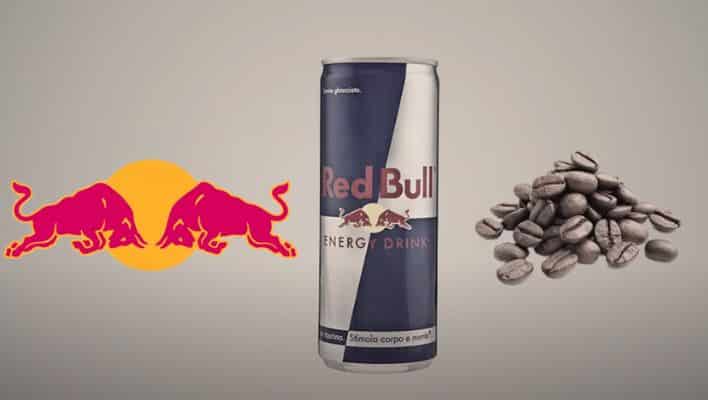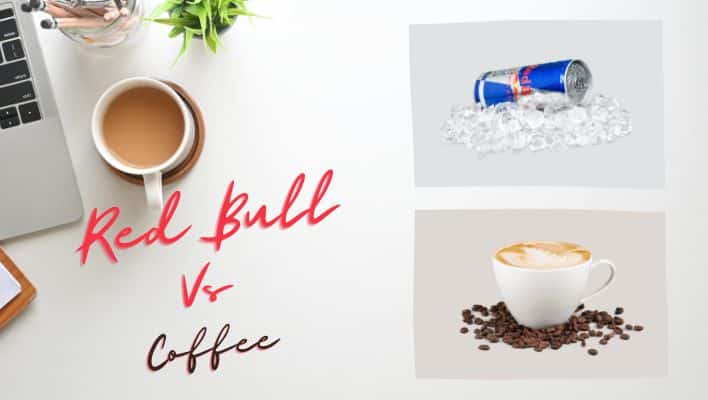Red Bull is a popular energy drink, while coffee is a widely consumed beverage. Red Bull and coffee are two popular choices for individuals seeking an energy boost.
Whether you’re studying for an exam, trying to stay focused at work, or simply need a pick-me-up, both options can provide a jolt of energy. However, there are distinct differences between the two. Red Bull is an energy drink that contains caffeine, taurine, and other stimulating ingredients, while coffee is a natural source of caffeine.
In this article, we will compare the effects, benefits, and drawbacks of red bull and coffee to help you decide which option is best suited to your needs.

Red Bull: The Wings Of Energy
Red Bull is a popular energy drink that has gained immense popularity over the years. With its signature blue and silver can, it has become synonymous with energy and vitality. But what exactly sets red bull apart from its competitors?
In this section, we will delve into the brief history and background of red bull, explore its ingredients and composition, examine its effects on the body, compare it with other energy drinks, and delve into its marketing strategies and target audience.
Brief History And Background Of Red Bull
- Red Bull was created in 1987 by Austrian entrepreneur Dietrich Mateschitz.
- Mateschitz discovered a Thai energy drink called krating daeng and decided to create a similar product for the European market.
- Red Bull was launched in Austria in 1987 and gained popularity for its unique marketing strategies and appealing taste.
- Today, red bull is available in over 170 countries and is one of the leading energy drink brands globally.
Ingredients And Composition Of Red Bull
- Red Bull contains several key ingredients, including caffeine, taurine, b-vitamins, sucrose, and glucose.
- Caffeine acts as a stimulant, providing an energy boost while enhancing alertness and concentration.
- Taurine is an amino acid that promotes cardiovascular health and aids in hydration.
- B vitamins play a crucial role in energy production within the body.
- The combination of caffeine, taurine, and B vitamins gives red bull its energizing effects.
Effects Of Red Bull On The Body
- Red Bull is known for its ability to increase energy levels and combat fatigue.
- The caffeine in red bull stimulates the central nervous system, promoting wakefulness and reducing the feeling of tiredness.
- Taurine, along with the B vitamins, helps support physical and mental performance.
- However, it is important to consume red bull in moderation as excessive consumption may lead to adverse effects, including increased heart rate, insomnia, and nervousness.
Comparison Of Red Bull With Other Energy Drinks
- Red Bull is often compared to other energy drinks, such as Monster and rockstar.
- While all energy drinks contain caffeine and other stimulants, the composition and taste of each brand can vary.
- Red Bull is renowned for its smooth and slightly carbonated flavor, which many find appealing.
- Additionally, red bull is available in various sizes and formats, catering to different consumer preferences.
Red Bull’S Marketing Strategies And Target Audience
- Red Bull has created an innovative and captivating marketing strategy that extends beyond traditional advertising.
- The brand sponsors various extreme sports events and supports athletes to associate itself with an active and adventurous lifestyle.
- Red Bull’s target audience primarily consists of young adults and college students who seek a quick energy boost and increased focus.
- Their marketing campaigns and collaborations with influencers have helped establish red bull as a trendy and aspirational brand in the energy drink market.
Red bull has carved a niche for itself as the energy drink of choice for many individuals seeking a quick pick-me-up. Its distinctive history, ingredients, and effects on the body make it stand out from its competitors. With its unique marketing strategies and target audience, red bull continues to soar high as the ultimate wings of energy.
Coffee: The Morning Fuel
Red Bull Vs Coffee
For many people, the day doesn’t truly begin until that first sip of coffee hits their lips. It’s the morning fuel that powers us through groggy mornings and jumpstarts our productivity. But have you ever wondered about the origins and cultural significance of coffee?
Or the science behind its energy-boosting properties? And how different brewing methods can impact the caffeine levels? In this section, we’ll delve into the world of coffee and explore its pros and cons as a source of energy. Let’s dive in!
The Origins And Cultural Significance Of Coffee
- Coffee’s journey began in Ethiopia, where legend has it that a goat herder discovered its energizing effects after noticing how his goats became lively after consuming the beans.
- From Ethiopia, coffee spread across the Arabian peninsula and eventually reached Europe and the Americas, becoming a beloved beverage worldwide.
- Today, coffee holds a special place in various cultures and traditions, often symbolizing hospitality, warmth, and social connections.
The Science Behind The Energy-Boosting Properties Of Coffee
- Coffee owes its energizing effects to caffeine, a natural stimulant that affects the central nervous system.
- Caffeine works by blocking the inhibitory neurotransmitter called adenosine, which leads to increased neuronal firing and the release of adrenaline, resulting in heightened alertness and focus.
- Additionally, caffeine can improve mood, reaction time, and cognitive functions, making it a popular choice for boosting energy levels.
Different Brewing Methods And Their Impact On Caffeine Levels
- The way coffee is brewed can significantly influence its caffeine content. Generally, brewing methods that involve longer contact time with water tend to extract more caffeine.
- Examples of brewing methods with higher caffeine extraction include espresso, turkish coffee, and French press.
- On the other hand, brewing methods like pour-over or drip coffee tend to have lower caffeine levels due to shorter water contact time.
Pros And Cons Of Drinking Coffee For Energy
- Pros:
- Coffee provides a quick and easily accessible source of energy, helping combat fatigue and drowsiness.
- The caffeine content in coffee can improve mental alertness, focus, and productivity.
- Moderate coffee consumption has been linked to a reduced risk of certain health conditions, such as type 2 diabetes and Parkinson’s disease.
- Cons:
- Excessive coffee consumption can lead to negative effects like jitters, increased heart rate, and difficulty sleeping.
- Some individuals may experience coffee-related digestive issues or increased anxiety.
- Caffeine dependency can develop with regular consumption, leading to withdrawal symptoms if caffeine intake is abruptly reduced or stopped.
Coffee-Related Health Benefits And Risks
- Health benefits:
- Coffee is rich in antioxidants, which can help protect against damage caused by free radicals in the body.
- Regular coffee consumption has been associated with a lower risk of liver diseases, such as cirrhosis and liver cancer.
- Some studies suggest that coffee may aid in weight management by boosting metabolism and suppressing appetite.
- Health risks:
- High coffee intake, particularly unfiltered coffee, may increase cholesterol levels in some individuals.
- Pregnant women should exercise caution and limit their caffeine consumption as it may be associated with an increased risk of miscarriage or preterm birth.
- Individual sensitivities to coffee can vary, and some people may experience negative effects like heartburn or acid reflux.
With its rich history, cultural significance, and undeniable energy-boosting properties, coffee has become an integral part of many people’s daily routines. However, it’s important to strike a balance and be mindful of individual tolerance and potential risks. So, go ahead and savor that morning cup of joe, but remember to listen to your body and make informed choices when it comes to your caffeine intake.
Red Bull Vs Coffee: A Head-To-Head Comparison
Caffeine Content: Red Bull Vs Coffee
- Red Bull: A regular 8.4 fl oz can of red bull contains around 80 mg of caffeine.
- Coffee: The caffeine content in coffee can vary significantly based on the brewing method and serving size. On average, an 8 fl oz cup of coffee contains about 95 mg of caffeine. However, this can range from 30 mg to 200 mg.
Immediate Effects On Energy Levels
- Red Bull: The combination of caffeine and other ingredients in red bull can provide an instant boost of energy, helping you feel more awake and alert.
- Coffee: Similar to red bull, coffee’s high caffeine content can deliver an immediate burst of energy, making you feel more energized and focused.
Long-Term Impact On Health And Well-Being
- Red Bull: Regular consumption of red bull or other energy drinks may have negative health effects due to their high sugar and calorie content. Excessive intake can contribute to weight gain, increased heart rate, and even dental issues.
- Coffee: In moderation, coffee has been associated with several health benefits, such as reducing the risk of certain diseases including type 2 diabetes, parkinson’s disease, and liver cancer. However, excessive consumption can lead to caffeine dependency, disrupted sleep patterns, and digestive issues.
Price Comparison: Red Bull Vs Coffee
- Red bull: On average, a single 8.4 fl oz can of red bull can cost around $2. This can add up quickly if you consume it regularly.
- Coffee: The price of coffee varies depending on the type of coffee beans, brand, and whether you brew it at home or purchase it from a coffee shop. Generally, brewing your own cup of coffee is more cost-effective compared to energy drinks like red bull.
Personal preferences and factors to consider when choosing between red bull and coffee
- Taste: Red bull offers a unique, fizzy and slightly sweet flavor, while coffee comes in a variety of tastes ranging from bold to mild, depending on the roast and origin of the beans.
- Health concerns: If you have any specific health conditions or concerns, it is advisable to check with a healthcare professional before consuming either red bull or coffee.
- Lifestyle: Consider your daily activities and how each beverage fits into your routine. For a quick pick-me-up during a busy day, red bull might be more convenient. However, if you enjoy the ritual of brewing and savoring a cup of coffee, it could be a better choice for you.
- Caffeine tolerance: If you are more sensitive to caffeine or prefer a milder stimulant effect, coffee might be a better option, as red bull tends to have a higher concentration of caffeine.
Making an informed choice between red bull and coffee depends on various factors, including personal preferences, caffeine tolerance, health considerations, and lifestyle. Understanding the differences in caffeine content, immediate effects on energy levels, long-term impacts on health, and price allows you to make a decision that aligns with your individual needs and goals.
Whether you reach for the energizing can of red bull or opt for a steaming cup of coffee, it’s important to consume both in moderation for optimal well-being.
Frequently Asked Questions Of Red Bull Vs Coffee
Can I Drink Red Bull And Coffee Together?
Yes, you can drink red bull and coffee together, but be cautious about the caffeine intake.
Which One Has More Caffeine: Red Bull Or Coffee?
Coffee generally has more caffeine than red bull, but the specific amount can vary depending on the brand and serving size.
Is Red Bull Healthier Than Coffee?
Neither red bull nor coffee can be considered “healthy” per se, as they both contain caffeine and sugar. It’s best to consume them in moderation.
Does Red Bull Have More Energy-Boosting Effects Than Coffee?
Red bull and coffee have similar energy-boosting effects due to their caffeine content, but the impact can vary depending on individual tolerance and body chemistry.
Conclusion
Both red bull and coffee have their own advantages and disadvantages when it comes to providing an energy boost. While red bull offers a quick burst of energy with its high caffeine content and added ingredients, coffee provides a more sustained and familiar source of stimulation.
It ultimately boils down to personal preference and individual needs. If you are looking for a quick pick-me-up, red bull may be the go-to choice for you. On the other hand, if you enjoy the ritual of brewing and savoring a cup of coffee, it may be the perfect way to start your day.
Remember, moderation is key when consuming caffeine, as excessive intake can lead to jitters, anxiety, and insomnia. It is important to listen to your body and make a decision that aligns with your lifestyle and wellbeing. So whether you reach for a can of red bull or a freshly brewed cup of coffee, make sure to enjoy it responsibly and in moderation.
Cheers to finding your perfect energy boost!









